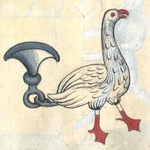|
Welcome earthlings to the Awful Book of the Month! In this thread, we choose one work of Resources: Project Gutenberg - http://www.gutenberg.org - A database of over 17000 books available online. If you can suggest books from here, that'd be the best. SparkNotes - http://www.sparknotes.com/ - A very helpful Cliffnotes-esque site, but much better, in my opinion. If you happen to come in late and need to catch-up, you can get great character/chapter/plot summaries here.  For recommendations on future material, suggestions on how to improve the club, or just a general rant, feel free to PM me. For recommendations on future material, suggestions on how to improve the club, or just a general rant, feel free to PM me.  Past Books of the Month 2011: January: John Keats, Endymion Febuary/March: Miguel Cervantes, Don Quixote April: Laurell K. Hamilton, Obsidian Butterfly May: Richard A. Knaak - Diablo #1: Legacy of Blood June: Pamela Britton - On The Move July: Raymond Chandler - The Big Sleep August: Louis L'Amour - Bendigo Shafter September: Ian Fleming - Moonraker October: Ray Bradbury - Something Wicked This Way Comes November: John Ringo - Ghost December: James Branch Cabell - Jurgen 2012: January: G.K. Chesterton - The Man Who Was Thursday Febuary: M. Somerset Maugham - Of Human Bondage March: Joseph Heller - Catch-22 April: Zack Parsons - Liminal States May: Haruki Murakami - Norwegian Wood June: James Joyce - Portrait of the Artist as a Young Man July: William S. Burroughs - Naked Lunch August: William Faulkner - The Sound & The Fury September/October: Leo Tolstoy - War & Peace November: David Mitchell - Cloud Atlas December: Kurt Vonnegut - Mother Night 2013 January: Walter M. Miller - A Canticle for Liebowitz Febuary: Alfred Bester - The Stars My Destination March: Kazuo Ishiguro - Remains Of The Day April: Don Delillo - White Noise May: Anton LeVey - The Satanic Bible June/July: Susanna Clarke - Jonathan Strange & Mr Norrell August: Michael Swanwick - Stations of the Tide September: John Wyndham - Day of the Triffids October: Shirley Jackson - The Haunting of Hill House November: Iain Banks - The Wasp Factory December: Roderick Thorp - Nothing Lasts Forever 2014: January: Ursula K. LeGuin - The Left Hand of Darkness February: Mikhail Bulgalov - Master & Margarita March: Richard P. Feynman -- Surely You're Joking, Mr. Feynman! April: James Joyce -- Dubliners May: Gabriel Garcia Marquez -- 100 Years of Solitude June: Howard Zinn -- A People's History of the United States July: Mary Renault -- The Last of the Wine Current: Barbara Tuchtman -- The Guns of August quote:The Guns of August (1962), also published as August 1914, is a volume of history by Barbara Tuchman. It is centered around the first month of World War I. After introductory chapters, Tuchman describes in great detail the opening events of the conflict. Its focus then becomes a military history of the contestants, chiefly the great powers. http://en.wikipedia.org/wiki/The_Guns_of_August Book is available here: http://www.amazon.com/The-Guns-Augu...k/dp/B002TXZS8A About the Author quote:Barbara Wertheim Tuchman (/ˈtʌkmən/; January 30, 1912 – February 6, 1989) was an American historian and author. She won the Pulitzer Prize twice, for The Guns of August (later August 1914), a best-selling history of the prelude to and the first month of World War I, and Stilwell and the American Experience in China, 1911–45, a biography of General Joseph Stilwell.[1] http://en.wikipedia.org/wiki/Barbara_Tuchman quote:While she did not explicitly mention this in The Guns of August, Barbara Tuchman was a witness to one of the pivotal events of the book: the pursuit of the German battle cruiser Goeben and light cruiser Breslau. In her account of this pursuit she writes: "That morning [August 10, 1914] there arrived in Constantinople the small Italian passenger steamer which had witnessed the Gloucester's action against Goeben and Breslau. Among its passengers were the daughter, son-in-law and three grandchildren of the American ambassador Mr. Henry Morgenthau."[11] As she was a grandchild of Henry Morgenthau, one suspects that she is referring to herself. This is confirmed in her later book Practicing History,[12] in which she tells the story of her father, Maurice Wertheim, traveling from Constantinople to Jerusalem on August 29th, 1914, to deliver funds to the Jewish community there. Thus, at age two, Barbara Tuchman was a first-hand witness to the pursuit of Goeben and Breslau, which she documented 48 years later. http://en.wikipedia.org/wiki/The_Guns_of_August Discussion, Questions & Themes: EVen in the poll thread we had people saying that Tuchtmann's facts were great but her analysis was bullshit and wrong. Agree? Disagree? More nuanced? How the hell did the world get into that mess? Further Reading: Final Note: If you have any suggestions to change, improve or assess the book club generally, please PM or email me -- i.e., keep it out of this thread -- at least until into the last five days of the month, just so we don't derail discussion of the current book with meta-discussion. I do want to hear new ideas though, seriously, so please do actually PM or email me or whatever, or if you can't do either of those things, just hold that thought till the last five days of the month before posting it in this thread. Thanks, and I hope everyone enjoys the book!
|
|
|
|
|

|
| # ? May 3, 2024 07:11 |
|
Oddly enough it turns out I have a paperback copy of this (Second Dell Printing, 1963! Completely falling apart at the spine!) just sitting on my shelves. I'll get started right away!
|
|
|
|
|
I usually skip forewords but Robert K. Massie's has got me really excited to dive into this.
|
|
|
|
Welp, bought the Kindle edition, hard not to at that price.
|
|
|
thehomemaster posted:Welp, bought the Kindle edition, hard not to at that price. Yeah, that's actually worth mentioning: five bucks, people. No excuses!
|
|
|
|
|
I'm a few chapters in and oh god the stupidity, oh god the poor horses. They're all prancing around on horses in a machine-gun war and they don't even realize it yet.
|
|
|
|
|
So far, I'm loving the accounts of the Kaiser gormlessly trying to use family connection to sidle up to his fellow monarchs. What would grandmother think if she heard cousins George and Nicky not getting along with poor cousin Willy?
|
|
|
moot the hopple posted:So far, I'm loving the accounts of the Kaiser gormlessly trying to use family connection to sidle up to his fellow monarchs. What would grandmother think if she heard cousins George and Nicky not getting along with poor cousin Willy? Yeah, the way she's drawing the Kaiser, he almost comes across as a buffoon. It's like the worst Thanksgiving dinner slap-fight in the history of humanity: "None of you respect me! I'll show you! My army can totally beat up your army!" Then you realize the punchline is thirty seven million dead.
|
|
|
|
|
I'm finishing up July 1914 before I start The Guns of August, though I did listen to it on audio book while at work like last year or the year before but what is the general contention about her conclusions. As for the Kaiser, I kind of feel bad for the guy. He was a guy who couldn't even cut his own food in a hyper militaristic society that valued strength and martial prowess. And before long he would be sidelined by hos own ministers and generals.
|
|
|
|
I love the set-up of all the "characters". Feels really ominous because of hindsight, but so crazy how much egotism played a part in it. And to think this was all happening but 100 years ago (but have things really changed beyond borders?)!
|
|
|
|
Great book, some of the writing was really clever. I did not expect to get a laugh out of it but the way she would point out the inconsistencies and habits of a lot of the major players was pretty funny. Which is odd considering I think I was crying through half of this book. She also drops some great quotes in places which added to the moments a lot. It's really sad how lame the reasons to go to war by these giant armies were. Germany won't stop mobilizing because it will mess up the timetables they have set up for the railroad and it will be like really hard to make new ones. I know it's just an excuse given to the Kaiser to get the twit to go away, but it was interesting because I had never, ever thought of the logistics of 1914 railroad movements. Those really would be hard to change. Guess we're invading France. France has to do an offensive right now because that was the plan they came up with like 19 years ago, or something. And they don't want to be embarrassed like the last time they lost. Quick, run at the Germans really fast with your stupid red pants in the woods it's the only way to win, we literally have thought of no other plan. England made sense, but I don't understand why Germany had to go through Belgium anyway (and be such dicks about it). This is the first book I have read about the war and so little of what happened makes any sense. I guess that's the point, and it got me into reading more stuff and it's just so pointless and sad. It just makes me sad about the entire human race. Thanks a lot Barbara.
|
|
|
|
I'm really interested in her other book about trying to get Mexico to invade USA to stop the states entering WWI.
|
|
|
|
I really enjoyed this book when I read it a few months back, but remember thinking that she really piled on the ridicule on some characters, like John French, while for instance Kitchener gets off pretty easily. WHile I don't know that much about WW1, it seemed a bit over the top. Does anyone have any perspective on that?
|
|
|
|
The Erland posted:I really enjoyed this book when I read it a few months back, but remember thinking that she really piled on the ridicule on some characters, like John French, while for instance Kitchener gets off pretty easily. WHile I don't know that much about WW1, it seemed a bit over the top. Does anyone have any perspective on that? The mil hist thread in A/T will by the way be a great resource for those of you wanting to get an expanded look into pretty much anything you want to know about the war. The reason why John French is ridiculed is because he was a bad at being a general and especially bad at fighting in an expeditionary force in a coalition. Refusing to liaise with his allies is incredibly dumb and not nearly as dumb as ordering all your supplies be dumped during the withdrawal and then wanting to retreat literally all the way across France to re-embark to England. Kitchener on the other had the incredible good of fortune both being the most right in the early war and then dying allowing him to look good in retrospect. Tuchman doesn't really seem to heap much ridicule on Joffre who IMO richly deserves it.
|
|
|
|
fattypigfatty posted:England made sense, but I don't understand why Germany had to go through Belgium anyway (and be such dicks about it). Because the French had been fortifying the Franco-German border for decades. Meanwhile the Franco-Belgian border is wide-open, provided you're willing to invade Belgium and by extension tick off England enough to drag her into the war as well. Keeping the English out of the war was (almost) not worth trying to invade through the direct Franco-German border, getting held up at the fortresses of Metz and Verdun and getting bogged down.
|
|
|
|
Given the success of the crown prince of Bavaria in Lorraine they actually might have just been able to punch through but doing so means giving up on the dream of envelopment.
|
|
|
|
Hieronymous Alloy posted:Yeah, the way she's drawing the Kaiser, he almost comes across as a buffoon. It's like the worst Thanksgiving dinner slap-fight in the history of humanity: "None of you respect me! I'll show you! My army can totally beat up your army!" Well Wilhelm basically was a buffoon. But he wasn't really a serious player in starting the war, the government had been pretty effective in sidelining him. gradenko_2000 posted:Because the French had been fortifying the Franco-German border for decades. Meanwhile the Franco-Belgian border is wide-open, provided you're willing to invade Belgium and by extension tick off England enough to drag her into the war as well. Keeping the English out of the war was (almost) not worth trying to invade through the direct Franco-German border, getting held up at the fortresses of Metz and Verdun and getting bogged down. Even if the Germans had avoided Belgium, I suspect Britain would have jumped in anyway. They certainly weren't about to let Germany defeat all her continental rivals, and the war provided a handy distraction from a brewing crisis at home with regard to the Irish Question. thehomemaster posted:I'm really interested in her other book about trying to get Mexico to invade USA to stop the states entering WWI. Everything about the Zimmermann telegram was ridiculous, and almost everybody thought the Brits had forged it because of how little sense it made. If Zimmermann hadn't told the whole world is was legit for some reason, it probably could have been swept under the rug. Of course it's no secret where America's loyalties lay, and I suspect they would have found their excuse to join one way or the other; too much money at stake for them not to. PittTheElder fucked around with this message at 04:49 on Aug 9, 2014 |
|
|
|
fattypigfatty posted:England made sense, but I don't understand why Germany had to go through Belgium anyway (and be such dicks about it). This is the first book I have read about the war and so little of what happened makes any sense. I guess that's the point, and it got me into reading more stuff and it's just so pointless and sad. It just makes me sad about the entire human race. Thanks a lot Barbara. The goal of invading through Belgium was to knock France out so quickly with such overwhelming force that they could turn to deal with Russia before the Russians were able to overrun Prussia, going through the French border would have taken too long. They were such dicks about it because of their experience with irregular snipers during the Franco-Prussian war 40 years earlier. e: Hieronymous Alloy posted:Further Reading: This is goddamn shameful. Dreadnought by Robert K Massie covers the pre-war period from about 1890 to the 1910's, focusing specifically on German-British relations and the arms race at sea. Castles of Steel also by Robert K Massie goes into great detail on the war at sea from 1914-1918. Learn about what a vile woman Admiral Beatty's wife was! Catastrophe 1914 by Max Hastings is another look at the immediate pre-war period and the first year of the war. Finally A World Undone by G.J. Meyer is by far the best single volume history of the war I've read. He goes into detail on the pre-war period and takes great pains to explain the history on why Germany, Austria, Russia and France all acted the way they did during following Franz Ferdinand's assassination and why the world exploded when war could have so easily been avoided. Every other chapter or so he breaks from the narrative of the war to delve into a quick biography of the major people of the war or to go into the relevant history of a belligerent nation. It's absolutely fascinating and if the Guns of August makes you want to read more about the Great War I would highly recommend starting here. uPen fucked around with this message at 06:16 on Aug 9, 2014 |
|
|
|
Hieronymous Alloy posted:Yeah, the way she's drawing the Kaiser, he almost comes across as a buffoon. It's like the worst Thanksgiving dinner slap-fight in the history of humanity: "None of you respect me! I'll show you! My army can totally beat up your army!" There was a massive problem with each nation's deployment plans; they simply weren't flexible enough to do anything between full mobilization and none. The German military, as well as the French and Russian militaries, couldn't afford to be caught on the back foot when another nation attacked. There was an ungodly combination of factors that meant sooner or later some minor dispute was going to blow up into a major war. Side note, where do you get the estimate of 37 million dead? The best estimates I've seen are about 17 million dead from the war, and another 50-100 million from the flu pandemic afterwards.
|
|
|
|
Hieronymous Alloy posted:Further Reading: The First World War by Hew Strachan, which at 340 pages is a concise, modern, and extremely readable summary of the war by an actual historian, which Tuchman was not. Strachan is also in the middle of writing a much longer series on the war, of which only the first volume is complete. George, Nicholas, and Wilhelm by Miranda Carter is a great book on the relations between the three cousins that headed Britain, Russia, and Germany, respectively; all were grandchildren of Queen Victoria. Great if you want to know what the monarchs were actually doing as the July Crisis unfolded. Paris, 1919 by Margaret MacMillan is an excellent book on the Paris Peace Conference, which wrote the various treaties that formally ended the war. It covers the very different extents to which the various parties wanted to punish Germany. Also notable is how Britain, France, and America basically told some of the smaller allies like Italy or Japan, to politely gently caress off and let the big boys do the deciding. If memory serves it also goes over how contrary to public legend, Versailles really didn't cause Nazis. The Balfour Declaration: Origins of the Arab-Israeli Conflict by Jonathan Schneer, is exactly what it says on the tin. The Arabs were pretty important partners of the British in toppling Turkish power in the Middle East, and the British threw them under the bus pretty hard, mostly because Balfour wasn't really the smartest of cookies. The Sykes-Picot Agreement is obviously a big focus, including how the actual settlement evolved from what was in The S-P Agreement to the borders we all know today (spoiler alert: The British really wanted all the oil at Mosul). Other works of which I've heard good things about, but have not read myself: The Sleepwalkers by Christopher Clark. The War That Ended Peace, also by Margaret MacMillan. AATREK CURES KIDS posted:Side note, where do you get the estimate of 37 million dead? The best estimates I've seen are about 17 million dead from the war, and another 50-100 million from the flu pandemic afterwards. I'm guessing he got it from the Wikipedia page on WWI Casualties, which lists a combined number of 37 million military and civilian casualties, but that's casualties, which includes 20 million wounded. PittTheElder fucked around with this message at 08:11 on Aug 9, 2014 |
|
|
|
If anyone here is into oral histories at all I can heartily recommend as further reading Lyn Macdonald's series of BEF oral histories, which go from 1914 to the German Spring Offensive in 1918. I'd also strongly recommend setting any British or American oral history against the carnets of Louis Barthas, a wonderful old grognard of a French conscript corporal; where English-language oral stories have a tendency to be "yes it wasn't very nice to be stationed in a shell-hole near Dead Cow Farm, but we made the best of it!", Barthas firmly refuses to like anyone and anything except his mates, and usually prefers to speak with German sentries than his own officers, as the sentries are far less likely to get him killed.Raskolnikov38 posted:The mil hist thread in A/T will by the way be a great resource for those of you wanting to get an expanded look into pretty much anything you want to know about the war. It is important to remember here that in the same way that Haig was the obvious candidate for the big job at the time when French got the tin tack, French was himself the obvious candidate to command the BEF in August 1914. (Which should tell you a lot.) quote:Tuchman doesn't really seem to heap much ridicule on Joffre who IMO richly deserves it. Well, the thing is, the history of war (and particularly the history of this one) is a story of people loving up (mostly because they have imperfect information and miss opportunities, sometimes because good people make bad decisions, sometimes because hopeless fuckups make the decisions). Joffre will always have the First Marne to set against this, added to which he kept his logistics somewhat intact during the retreat, and he didn't poo poo himself and panic like Sir John did (oh, the difficulties of reading about French's relationship with the French). Whatever else you want to say about him, he'll always have the First Marne. The other thing that's interesting about Joffre is that he was actually an engineer who had never had strategic responsibility before being appointed as CinC of the French army in 1911 (someone else said "non!"), which is rather like if they'd put Wully Robertson in charge of the BEF. Trin Tragula fucked around with this message at 09:51 on Aug 9, 2014 |
|
|
PittTheElder posted:I'm guessing he got it from the Wikipedia page on WWI Casualties, which lists a combined number of 37 million military and civilian casualties, but that's casualties, which includes 20 million wounded. Yeah, I wasn't thinking too hard when I made that post. uPen posted:
See, this is why I called y'all military history people over here! Thanks for jumping in!
|
|
|
|
|
Hieronymous Alloy posted:They're all prancing around on horses in a machine-gun war and they don't even realize it yet. As a side-note to this, the Nobel Prize-winning novelist Claude Simon was one of a handful of survivors of a disastrous French cavalry charge in 1940. Incredibly enough, they were still at it twenty years later, in even more futile circumstances. His cavalry brigade was ordered to counterattack advancing German tanks during the fall of France: quote:All my life I have been favored by incredible luck. It would take too long to enumerate all of the occasions, though one example stands out among all the others: In May 1940, my squadron was ambushed by German tanks. Under fire, the foolish order was given to “fight on foot,” followed almost immediately by the order, “on horseback, at a gallop!” Just as I put my foot in the stirrup, the saddle slipped. Just my luck, I thought, in the middle of the battle! But that’s what saved me: On foot, I found myself in a dead zone, a level crossing where I couldn’t be hit. The majority of those who had remounted were killed. I could tell you about ten or twelve occasions when I had similarly good luck. Often, as in the case of the ambush, what one thinks is bad luck turns out to be the opposite.
|
|
|
|
Trin Tragula posted:The other thing that's interesting about Joffre is that he was actually an engineer who had never had strategic responsibility before being appointed as CinC of the French army in 1911 (someone else said "non!"), which is rather like if they'd put Wully Robertson in charge of the BEF. Something that Tuchman covers quite well in Guns of August is how Joffre ended up in the post in the first place. The selection criteria makes some sense, but drat guys, really?
|
|
|
|
One historiographical note: the blame for the outbreak of the war is still a very passionate topic, with a lot of political and national overtones. Tuchmann's view that it was more misunderstanding and miscalculation than malice has, I think, as many supporters as any other camp. However, there are plenty of other views. When you see how many diplomatic crisises and small wars there were in the years before 1914, it almost feels inevitable that one of them was going to snowball out of control and start a general war.
|
|
|
|
Warning: this is going to get a bit history wonk-ish. If you really don't give a poo poo about controversies between academic historians over historical interpretation, well, ignore this post. Just read Tuchman (edit: is her name spelled wrong in the threat title on purpose?) and enjoy the narrative. One of the things that you really, really have to appreciate about Tuchman's work is just how profoundly it is a work of its time, namely the early 60s. The question of who was to blame for World War One had been a huge, politically fraught topic ever since 1919, but in the early 60s it erupted full force again with what eventually became known as the Fischer Controversy. A little bit of backstory: Following WW1 the issue of who was to blame for it all was of immense immediate import, mostly because every country in Europe ran a huge deficit to pay for the conflict and somebody had to be assigned the guilt and handed the bill. There's a fairly respectable line of reasoning that says that's one of the major reasons the war went on so long - no one could afford (in the money sense) a negotiated peace after about 1916. That's one of the major reasons the Germans came down on the Russians like a ton of bricks at Brest-Litovsk in 1917 and why Article 231 - the notorious "War Guilt Clause" - was built into Versailles when the Germans finally cracked. After WW2, however, it became very much the fashion to spread guilt for the first war around to all involved parties. This has everything to do with the politics of the post-war period. On the one hand it's appealing for the growing number of people who were highly critical of 19th century colonialism, in that it places blame for the horrible first half of the 20th century on the 19th century great powers and the way that they organized the world to benefit themselves. If you describe that whole system as so dangerously balanced that a minor regional crisis can spiral out of control into a multi-continent international conflict that kills millions and is one of the causes of an even worse war a generation later, it makes demands for local self-rule seem eminently reasonable. From the perspective of the Cold War it also helps to lessen (West) German culpability for Hitler. If WW1 is just this giant, awful tragedy that the European powers blundered into than the settlement at Versailles is a major injustice and the rise of nationalistic fascism in Germany becomes that much more understandable and not purely the Germans' fault. This is politically useful for the various NATO allies who are dealing with the beginnings of the Cold War in the early 50s and who are pushing for W. German rearmament to help serve as a deterrent against Soviet expansion. If, however, Germany really was to blame for WW1 then the punishments doled out at Versailles, while arguably still harsh, are justified and what followed is even more profoundly their fault. In this view Germany becomes a major destabilizing force on the European continent, the bearer of a perversely militaristic tradition that was responsible for causing one continental and two world wars in the span of 70 years, and the dismemberment of the German state becomes a logical pre-requisite for continuing European peace. This is basically the narrative that becomes standard for anyone arguing against German rearmament, and is an argument which crops up again decades later when Germany reunifies in the early 90s. From the standpoint of the historian, all of this explodes in the early 60s when a German historian named Fritz Fischer published Germany's War Aims in the First World War. He managed to dig up some previously unseen/unreleased documents that fairly convincingly showed that Chancellor Bethmann-Hollweg had a very clearly articulated foreign policy at least as early as September 1914 that involved aggressive military expansion of Germany's borders. Fischer maintained that this was part of a larger pattern of Germany's political elites wanting an aggressive foreign policy with an eye to continental domination that went back at least to the turn of the 20th century. What followed was a giant cluster gently caress of German historians arguing acrimoniously for about a decade. Careers rose and fell over rebuttals and counter-claims, and the issue is still fairly open. Things got so bad that his publisher's office was firebombed. This is not a thing that usually happens in debates between academics. These days the competing interpretations are more nuanced than they were in the early sixties and the exact intellectual terrain has shifted a bit, but a basic agreement or disagreement with Fischer's argument - especially the stance one takes on the primacy of domestic politics or foreign politics - is still one of the ways that people who study modern German history sort themselves. In this way the basic arguments surrounding the Fischer Controversy have actually come to resemble the conflict that they describe. I bring all this up because Tuchman published in 1962, at the height of Fischer blowing up in Germany. She would have been very much aware of Fischer's work while she was finishing her own, and she really needs to be read with that context in mind. recommended further reading: First off, the granddaddy of them all, Fritz Fischer, Germany's Aims in the First World War. I would also highly recommend his War of Illusions: German Policies from 1911 to 1914, which was written about 15 years later. Hans-Ulrich Wehler The German Empire: 1871-1918. This is another classic and a good way of seeing how another hugely influential German historian took up a lot of Fischer's ideas and moved them forward. As much as I personally dislike his work I feel it would be remiss not to mention Niall Ferguson's The Pity of War: Explaining World War One. It is a good example of scholarship that tries to refute Fischer and Wehler's basic arguments, it's fairly recently written, and it's fairly accessible to a general audience being both written with the non-academic public in mind and without the linguistic burden of having been translated from German. If you read Ferguson for the love of god read Fischer or Wehler as well, but ultimately which explanations you feel are more compelling is up to you. Finally, one of the more recent forays into explaining how and why things went tits up in 1914 is Isabel Hull's Absolute Destruction: Military Culture and the Practices of War in Imperial Germany. I'm personally a big fan of this book and feel that it does a really good job of examining a lot of the continuities between German behavior at the start of WW1 and over-all military policies during the decades before that. Whether you ultimately agree or disagree it's well researched and well-written. Cyrano4747 fucked around with this message at 18:27 on Aug 9, 2014 |
|
|
Cyrano4747 posted:Warning: this is going to get a bit history wonk-ish. If you really don't give a poo poo about controversies between academic historians over historical interpretation, well, ignore this post. Just read Tuchman (edit: is her name spelled wrong in the threat title on purpose?) and enjoy the narrative. Thanks for this context! Do you think Tuchman is trying to swing the narrative one way or another, or striking a middle ground? Parts of her narrative do pretty clearly seem to be "yeah, the Germans started it," but others seem to blame imbecility and inertia more than anything else.
|
|
|
|
|
Hieronymous Alloy posted:Thanks for this context! Do you think Tuchman is trying to swing the narrative one way or another, or striking a middle ground? Parts of her narrative do pretty clearly seem to be "yeah, the Germans started it," but others seem to blame imbecility and inertia more than anything else. Given the way that she portrays Bethmann-Hollweg and the general way that she really avoids foreign policy all together in favor of highlighting the strategic needs of the military and the primacy of the almighty time table, I think she's very much adopting the earlier view that Fischer was writing against. With the exception of England's guarantee of Belgian neutrality foreign policy as a tool and any sort of long term agendas or goals are really given short shrift in this book. In a lot of ways this is a very famous, very well articulated example of a view of the beginning of World War 1 that, in historical circles at least, was rapidly falling out of favor precisely when it was published. I suppose I harped so much on Fischer because of what a great example this is of the general position that he was responding to, and anyone interested in further reading on this subject really needs to explore what he and those who followed after him were getting up to. I actually began that lengthy post just as a list of suggested readings for anyone who wanted to get more after Tuchman, but then realize that it' would be a bit of a shame to just toss Fisher out there without pointing out how he relates to works like Tuchman's. That said, it's a little unfair to try to plug her directly into what's going on in German academic circles. Her early career is primarily journalistic and that's essentially the sort of writing that she's doing. A glance through her bibliography is pretty telling: it's entirely bound and edited volumes of document collections, memoirs, and a handful of secondary sources. I don't think her intention was ever to really engage the German historical community with an argument, but to present in a single volume for the literate American public a narrative of how the war got kicked off. It's a combination of journalism and history that is very much in the British public intellectual tradition. The other thing to consider is the Cold War American context of when she was writing. She chose to concentrate almost entirely on how military necessity and the technological and logistical needs of a modern war made foreign diplomacy and even foreign policy almost irrelevant. Once the decision had been made that countries X, Y, and Z were the likely enemies for the next war and mobilization plans drawn up, there is a certain inevitability to conflict that becomes its own circular logic; we plan to go to war with France because they are the enemy, and they are the enemy because we plan to go to war with them. Looked at against the backdrop of the late 1950s - the escalating arms race, the ever-more acrimonious relations between the USSR and the US, and the abandonment of containment policy by the State Department under Dulles in favor of brinksmanship and massive retaliation - it's hard not to read a critique of what were then contemporary events in Tuchman's description of automated responses and military primacy leading to global warfare.
|
|
|
|
Cyrano4747 posted:A little bit of backstory: Following WW1 the issue of who was to blame for it all was of immense immediate import, mostly because every country in Europe ran a huge deficit to pay for the conflict and somebody had to be assigned the guilt and handed the bill. There's a fairly respectable line of reasoning that says that's one of the major reasons the war went on so long - no one could afford (in the money sense) a negotiated peace after about 1916. That's one of the major reasons the Germans came down on the Russians like a ton of bricks at Brest-Litovsk in 1917 and why Article 231 - the notorious "War Guilt Clause" - was built into Versailles when the Germans finally cracked. What I picked up from Margaret MacMillan's Paris 1919 was that the War Guilt Clause was not really anything special for Germany; every treaty signed by a Central Power had a similar clause written into it because the Allies needed those countries to acknowledge their complicity in the war in order to justify penalties against them. Austria/Hungary, Bulgaria and Turkey all had to sign such clauses as well, but it was Germany that especially picked up on its existence as a way to rail against how oppressive, punitive, cruel, etc. the Allies were being
|
|
|
|
PittTheElder posted:The First World War by Hew Strachan, which at 340 pages is a concise, modern, and extremely readable summary of the war by an actual historian, which Tuchman was not. Strachan is also in the middle of writing a much longer series on the war, of which only the first volume is complete. Yeah about that, Strachan's first volume of his proposed trilogy came out 14 years ago. The project is officially dead in the water. That general history of the war he wrote was kind of his half assed way of finishing it up.
|
|
|
|
Any suggestions for next month's book? Field is wide open at this point -- we've run through a lot of alternatives from classic lit to nonfiction so at this point i'm open to any suggestions, they'll all go in the poll.
|
|
|
|
|
Pride & Prejudice?
|
|
|
|
James Brabazon's My Friend The Mercenary. It's got all sorts of poo poo going on, from the wide narrative of sneaking into Liberia during a civil war, to how you should feel about his escort, a South African mercenary who was in Special Forces for the apartheid state, and after the events of the book participates in a attempted coup in Equatorial Guinea, but seems kinda like an OK dude from James perspective.
|
|
|
|
I'm tired of recommending The Secret History, so I'm just gunna read Goldfinch and start my own Donna Tartt thread. Anyway, I got three suggestions, all (fairly) short and (seemingly) interesting, from my "to read" list: We Are All Completely Beside Ourselves by Karen Joy Fowler, about a girl who can't remember why she doesn't know who her family is, The Golem and the Jinni by Helene Wecker, about a cultural clash between Jewish and Arabic culture in 1899 New York, and Swamplandia! by Karen Russell, about a twelve year old in Florida who winds up being forced to manage a dysfunctional family of alligator wrestlers.
|
|
|
|
If I could make a couple suggestions: - Robert Coover's The Universal Baseball Association, Inc., J. Henry Waugh, Prop. Deeply black comedy about an ordinary schmoe obsessed with a fantasy baseball game that's more real to him than his actual life. Unfortunately doesn't seem to be available in ebook form. (ETA: I'm wrong, it is available as a Google ebook.) - John Dos Passos's The 42nd Parallel. First book of his "U.S.A." trilogy, but stands well enough on its own. If you like E. L. Doctorow's historicals (Ragtime et al), this should be up your alley. Big sprawling story that follows the interlocking lives of five men and women, interspersed with montages of news and entertainment clippings and mini-biographies of people who shaped the time. Selachian fucked around with this message at 07:24 on Aug 27, 2014 |
|
|
Bubbacub posted:Pride & Prejudice? Ok, here's my thought: How about next month I'll run a "Let's Read" of Pride & Prejudice. I'll divide it up into sections and we can read a section a week. It'll be a bit of an experiment but nothing we can't handle. If we want we can also watch the BBC 6-part miniseries in parallel and make comparisons. Does that sound good to people? It'll be a bit of an experiment for the BOTM but I think it might be worth trying.
|
|
|
|
|
[pointless post] I would love to be a part of these lets read things but my backlog of books is so huge, and my reading times so inconsistent that I can't commit at all. But as a random lurker I like reading about what you lot choose to read and your thoughts on those books. So I hope you choose an interesting one. [/pointless post] Edit: Yes it does sound good!
|
|
|
|

|
| # ? May 3, 2024 07:11 |
|
Yeah, sounds good. I've never gotten around to watching the BBC series, so it'll be cool to see how they compare.
|
|
|













 Yes, it's like a lava lamp.
Yes, it's like a lava lamp.















